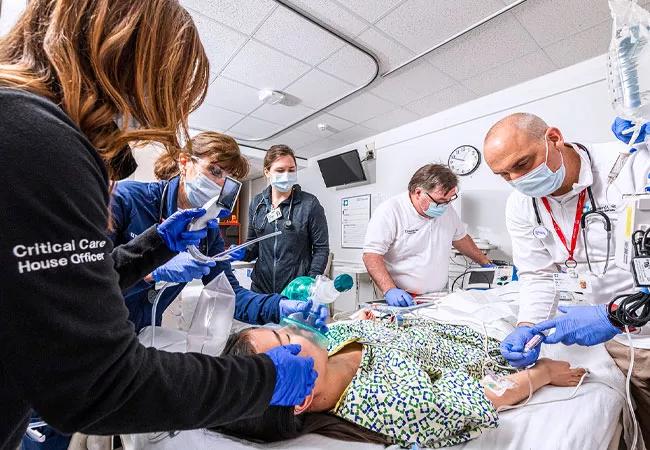Study looks at cardiopulmonary arrest and activation rates

Image content: This image is available to view online.
View image online (https://assets.clevelandclinic.org/transform/8de732af-8a39-4f63-9953-e75626c84ac9/21-NUR-2585200-Research-Dedicated-Rapid-Response-Team-CQD_650x450_jpg)
Rapid Response Team
A dedicated rapid response team at Cleveland Clinic can be activated by any employee, patient or family member when an individual is decompensating from their previous health status or becomes ill or injured while on main campus. For 11 years, Tony Di Stefano, BHS, RN, has served among more than 20 clinical nurses, respiratory therapists, physicians and nurse practitioners who work full time on day and night shifts on the rapid response team at main campus.
Advertisement
Cleveland Clinic is a non-profit academic medical center. Advertising on our site helps support our mission. We do not endorse non-Cleveland Clinic products or services. Policy
While many hospitals rely on ad hoc rapid response teams, dedicated teams are less common. In addition to providing rapid clinical intervention, the dedicated team at Cleveland Clinic also educates clinical nurses and reviews all codes. The Critical Response and Resuscitation Committee oversees its performance.
Di Stefano pursued a research project to examine dedicated rapid response teams. “One of the motivators for me was witnessing firsthand the success of our team and receiving positive feedback from leadership and nurses,” he says. “We did a literature review and didn’t find much on dedicated rapid response teams.”
With Nurse Scientist II Lee Anne Siegmund, PhD, RN, ACSM-CEP, Di Stefano conducted a retrospective database study of changes in cardiopulmonary arrest and rapid response team activation rates on medical and surgical units. “We wanted to see if the implementation of a dedicated rapid response team, which regularly rounds on high-risk patients and educates nurses, was associated with the rate of cardiopulmonary arrest and the rate of activations over the course of the team’s first three years,” says Dr. Siegmund.
Outcomes related to the rate of cardiopulmonary arrest and survival to discharge improved during the initial three years of the dedicated rapid response team. Activation rates also increased.
“The goal is for calls to rapid response teams to increase,” says Di Stefano. “The team wants nurses to feel comfortable calling them before a situation becomes a cardiopulmonary arrest.”
Advertisement
That can be fostered through relationship-building. “Rapport between clinical nurses and the rapid response team is so important,” says Di Stefano. “If nurses are hesitant to call or feel uncomfortable, they won’t call the team in time.”
To help build rapport and prevent patient decompensation, the team conducted monthly educational rounds. The rounds included mock codes and simulations to familiarize clinical nurses with equipment and teach them what to look for in a rapid assessment when a patient’s condition is deteriorating.
“Education is so critical to help support nurses at the bedside,” says Di Stefano. “A big part of our job as a dedicated rapid response team is focused on prevention.”
That, in turn, may affect failure-to-rescue rates. “If clinical nurses don’t call the team in time, it may lead to a failure to rescue,” says Dr. Siegmund. “We hope other hospitals may learn from our research.” She and Di Stefano add that more research is needed to compare data from both before and after implementation of a dedicated team.
Advertisement
Advertisement
Harnessing digital innovations to enhance nurse confidence and clinical outcomes
Regional organizations collaborate to address nurse faculty shortage
How wellness habits help nurses flourish
Planning continues with critical, patient-focused input from nursing teams
Strengthening care through targeted resources and frontline voices
Embracing generational differences to create strong nursing teams
CRNA careers offer challenge and reward
An unexpected health scare provides a potent reminder of what patients need most from their caregivers